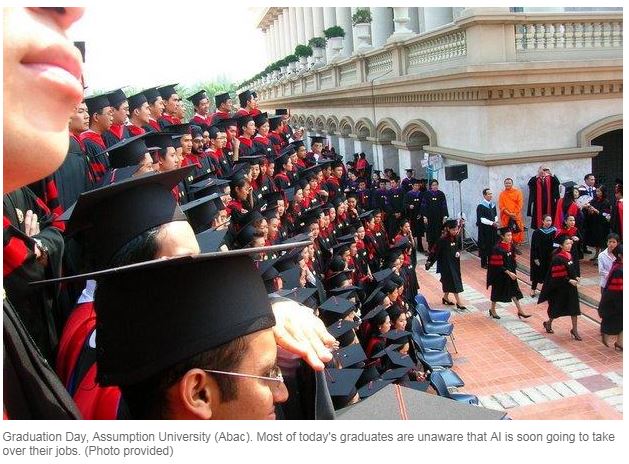Thailand: Robots tipped to snuff out graduates’ job hopes
By 2030, 72% of university graduates in Thailand could be either unemployed or working in a job that does not require a bachelor’s degree as their jobs will have been taken away by artificial intelligence (AI) and robots, according to Udom Kachinthorn, Deputy Minister of Education.
“Thus, if Thai universities do not adapt and cannot build a workforce with future-proof skills, the country may have to cope with largest ever rate of unemployment,” Dr Udom said quoting a report released by World Bank’s early this year on youth unemployment.
He said digital transformation will totally redefine the way people work, live and learn.
“Some jobs will disappear, others will grow, and jobs that don’t even exist today could become commonplace,” he said Tuesday at a seminar in Bangkok organised by the Education Council.
The deputy minister warned that administrative and office workers who lack all but routine skills will be the most vulnerable of being made “redundant” and being replaced by machines.
High-in-demand skills will include cognitive abilities like problem solving, critical thinking, analysis or creative work, Dr Udom said.
He warned that universities and teachers must embrace change by using digital technology to make their classes and content more lively, relevant and responsive to the demands and lifestyles of a new generation.
He said the deeply entrenched past and current models of the Thai education system are already outdated because they focus on building a very limited set of skills.
“Now the universities of the future must teach students how to become learners. Schools and universities must change from being just classrooms to becoming learning spaces. Pedagogues must assume new roles as coaches who provide guidance, not only giving lectures,” he said.
Universities will also have to contend with “virtual universities” and online teachers luring students with cheap and easy-to-access digital classrooms.
“IT companies like Google and Microsoft now offer online courses. Their courses are cheaper and easier to access than those provided by universities. And students don’t have to sit in classes for four years to study unrelated programmes just to earn their degree,” he said.
Digital disruption has already forced a number of universities to close in developed countries.
At least 500-600 universities and colleges in the US have been shuttered over the past decade while half of the 4,000 colleges and universities in American are at risk of bankruptcy due to low enrolment numbers, he warned.
“The same scenario could happen in Thailand, too, if Thai universities and teachers fail to adapt and move [successfully] into the future,” Dr Udom said.
The latest figures from the Education Ministry show that the number of Thai students enrolling at certain universities in the country has dropped by 70%.
“To survive, Thai universities need to adjust their strategies, modernise, shut down outdated majors that are not in high demand, and collaborate more,” Dr Udom said.
Source: https://www.bangkokpost.com/news/general/1538238/robots-tipped-to-snuff-out-graduates-job-hopes


 English
English




